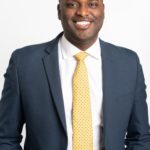“If elected, I will endorse, prioritize, and support:”
Yes
Yes
Yes
Yes
Yes
Yes
Yes
Yes
Yes
Yes
Yes
Yes
Yes
Yes
Yes
Additional Comments
Provide additional comments if necessary.
Response
Fixing our democracy is personal to me. Unlike many of the people we are used to seeing in our politics, I don’t come from money or from a political family. I grew up in the Village of Spring Valley, New York, where I was raised by a young, single mom who, like so many women throughout my district, and all throughout this country, worked multiple jobs just to provide for our family—even as we relied on Section 8 housing and food stamps.
My mom got help from my grandparents. My grandfather was a janitor at Pomona Middle School, and later, he was a small business owner. My grandmother cleaned homes, and when day care was too expensive, she took me to work with her. Now, I’m running to represent the same people whose homes I watched my grandmother clean growing up.
It was through the strength of a grassroots, people-powered campaign that I, having never before run for office, and running as an openly gay, black, progressive candidate in the suburbs of New York City, defied the odds and got three times as many votes as my second-place finisher, the son of a billionaire who spent $5.4 million in an attempt to buy the election. In fact, in the 244-year history of the United States, there still has not been an openly gay, black member of Congress. That changes with my election this fall.
We have never been at a moment in American history when we have more urgently needed people in office for whom policy is personal. I think we get better policy outcomes when policy is personal for our representatives. They can be trusted to always fight for the best interests of their constituents, even when the doors are closed in the halls of Congress and our constituents can’t see what we are doing. It’s why I don’t take money from corporations.
I’ve been in this fight my whole life. I got my start in politics as a freshman in high school, when I saw how difficult it was to pass a school budget in the East Ramapo Central School District. I reactivated the Spring Valley NAACP Youth Council and organized my schoolmates, and we registered people to vote in our community and turned out the vote. As an undergraduate at Stanford University, I became increasingly involved in the fight for equity by leading a campaign to increase faculty and graduate student diversity, as well as get a living wage for dining hall and maintenance workers. In my senior year of college, when the Palo Alto Police Chief made comments that embraced racial profiling, I organized other students and we helped to get her to resign and obtain reforms within the Palo Alto Police Department. After college, I worked in the Obama Administration at the Department of Justice,vetted candidates for federal judgeships and co-authoring a report to Attorney General Eric Holder on criminal justice reform. At Harvard Law School, I provided free legal services to indigent defendants in Dorchester and Roxbury. After law school, I co-founded a nonprofit called Rising Leaders, which teaches professional skills to underserved middle-school students in Harlem, Washington, D.C., and Seattle. More recently, I worked as a lawyer for Westchester County, fighting in the courtrooms on behalf of my future constituents.
Now, I’m running to fight for all of the people in my district and across the country, and I plan to start by fixing our democracy.

Short Answer
The Question:
Candidate Reponse